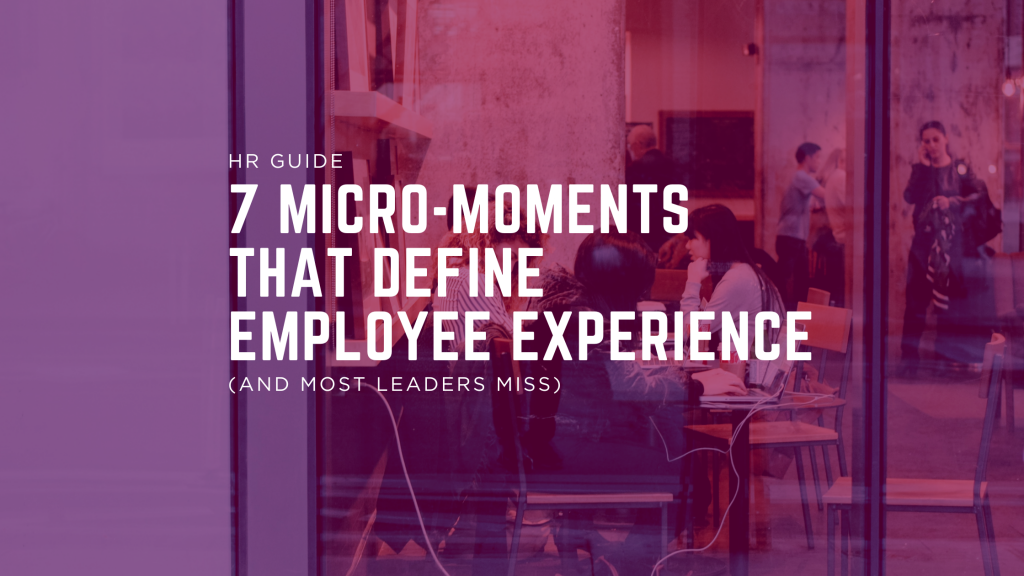Think about the last time you felt seen at work. If the only thing that comes to mind is your last promotion two years ago, you’re not alone. We spend so much of our lives at work, and yet what we usually remember are the times we weren’t seen. The missed lunch invite. The email where our name was left off. The idea that got ignored.
It all happened to me. But the moment that really stuck? When my birthday got forgotten. I didn’t expect gifts or flowers from my manager, just a simple “happy birthday.” I already haven’t thought highly of them on time, but that day was the moment I mentally checked out.
I guess everyone has experienced something like this in their career. These moments shape our feelings about the workplace and we should be more aware of them if we want people around us to feel visible.
It’s about being seen
Let’s stick with the birthday example. Remembering a birthday is easy: write it in a calendar. But many leaders don’t. They’re focused on what feels urgent for them, such as board meetings, missed numbers, engagement surveys no one cares about, or praising their favorite colleague’s big project.
Meanwhile, what gets missed are the moments and acknowledgement that actually define trust. And once trust is gone, people stop sharing, stop opening up, and ultimately stop caring. You don’t have to like everyone on your team. But showing respect is the bare minimum.
So here’s the real challenge: how can leaders notice and act on the small, human moments that shape employee experience more than any policy ever will?
7 (not so micro-)moments
1. The First Hour of Onboarding
First impressions count. They set the tone for how someone sees their manager and the workplace. Leaving a new hire waiting, giving no login, no clear plan, no sense of what the next days will look like? That is a big red flag before they even start the role.
2. The “After-Feedback” Moment
Giving feedback can be hard enough. But leaving it hanging with awkward silence afterwards? That’s worse. It leaves people uncertain, guessing where they stand. A simple follow-up shows you care and want to work with them.
3. The Missed Recognition
There’s always that one solid worker. Always delivers, always shows up, adds value in meetings, never late on deadlines. But when was the last time you actually recognised their work? Over time, being overlooked builds disengagement and frustration.
4. When Personal Life Crashes Into Work
Work doesn’t put life on pause. Loss, grief, illness, or even happy events like a birth or engagement come into play. How you respond to these moments shows whether you actually value the person behind the role.
5. The First Mistake
Everyone makes mistakes, and the first one is always the most awkward. Your reaction as a manager matters. Be supportive, explain what went wrong, and guide them through it. What you must not ever do is shame them publicly.
6. The (Invisible) Milestones
Do you know your team’s work anniversaries? Their visa struggles? Their new certifications? That they ran a marathon, got a driver’s license, or finished a course? If you don’t know, you’re missing chances to show them they matter.
7. The Goodbye
When someone leaves, the last impression counts as much as the first. A rushed exit or worse, being absent says more about you than them. Acknowledge their contribution. Make them feel their time here mattered.
The Takeaway
So what does this mean for your leadership?
- Get to know your people! What matters to them, who they are outside of work.
- Note birthdays, anniversaries, milestones and put them in your calendar.
- Build a habit of being present and acknowledging others daily.
No one expects leaders to micromanage every detail. But awareness of these micro-moments helps you focus on quality over quantity. It’s not about remembering everything. It’s about noticing and making them feel seen.
Employee experience looks different for everyone. But missing the moments above? That will define your reputation as a manager, shape how people see their workplace, and influence how they engage in the future.
The truth is: employees rarely remember the polished campaigns or any HR initiatives. They remember the small moments.
What’s the moment that made you feel invisible at work, how did it make you feel? And are you repeating that pattern with your own team?

